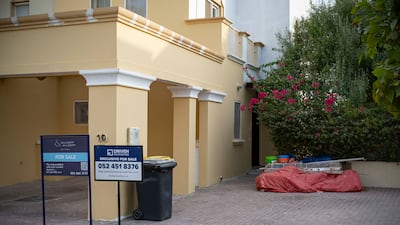Dubai’s real estate sector is booming and has been attracting a growing amount of investment, but “property speculation remains within desirable limits”, the Dubai Land Department has said.
The emirate’s real estate market recorded about 163,000 transactions valued at more than Dh544 billion ($148 billion) in the first nine months of this year, the Dubai Media Office cited the Dubai Land Department as saying on Tuesday.
Real estate investments also exceeded Dh376 billion during this period, “driven by advanced infrastructure and a strong regulatory framework”, the DLD said.
“While the sector continues to achieve record growth, property speculation remains within desirable limits, not exceeding 20 per cent, reflecting stability and sustainability in investment trends.”
Dubai’s market has evolved significantly since 2007-2008, with much greater regulation of the real estate and finance sectors, including the introduction of higher loan-to-value ratios, the introduction of escrow and other restrictions related to the resale of off-plan units, said Matthew Green, head of research – Mena, at CBRE.
“This has ultimately created a less volatile and speculative market, which in turn has been key in attracting a much wider demographic of new investors to enter the space,” he told The National.
In the third quarter of this year, the value of residential transactions increased 32.5 per cent annually and 19.5 per cent quarterly to Dh139.8 billion, “reporting its highest record-breaking level”, EFG Hermes said in a report last week.
Primary sales grew 30 per cent year on year, with developers launching more new projects. Off-plan sales activity was up 30 per cent annually and 27 per cent quarter-on-quarter, it said.
According to data from Reidin, off-plan sales amounted to $34.3 billion in the first half of this year, and are on track to exceed $58.3 billion for last year.
With about 200,000 new units launched since last year alone, “there has been a massive shift in the composition of the sales market, which has moved from a 50/50 split in volume terms during 2015, to 70/30 in favour of the off-plan market”, Mr Green said.
“Whilst this is obviously reflective of rising and sustained demand for new properties, the growing disparity between ready and off-plan volume does need to be monitored from a fundamental perspective to ensure end-user and occupier demand remains sufficient to meet with the significant future deliveries.”
Other important factors also need to be considered, in terms of investor preference for projects, the significant effect of payment plans on an investor’s ability to acquire an asset, and the diminishing availability of ready and available properties for sale, he added.
Dubai this month unveiled its Real Estate Sector Strategy 2033, which seeks to double the sector’s contribution to the emirate’s gross domestic product to about Dh73 billion by 2033. The strategy also aims to raise real estate transactions by 70 per cent to Dh1 trillion by 2033, increase home ownership rates to 33 per cent and expand the value of Dubai’s real estate portfolios to Dh20 billion.
It will include the introduction of a series of programmes by 2033 to raise the quality of developments, enhance transparency and leverage data for better market forecasting.
Increasing transparency and showcasing high-value real estate assets to attract significant international investment, particularly from emerging markets, remains a focal point, Marwan bin Ghalita, director general of Dubai Land Department, said.
They are also reinforcing the support infrastructure for the sector and the use of technology, including artificial intelligence and data centralisation to support investors and end users.
Such initiatives, alongside investment reforms and supportive regulations for businesses, are enhancing Dubai’s real estate market, S&P Global Ratings said in a report this week. Factors including the rising population, visa reforms such as the golden visa, and high rents, are also pushing people to buy property.
So far, the escalation of geopolitical conflicts in the Middle East has had no significant effects on Dubai’s residential real estate market, S&P said.
“Dubai’s dynamic economic environment, its reputation as a safe haven, and the low tax regime sustain the emirate’s attractiveness for global investors.”
Property prices, which have risen sharply in recent years, will remain stable over the next 18 months and could decline afterwards due to increasing supply, according to S&P.
“A potential increase in supply could saturate the unfulfilled demand, and lead to lower prices and rents,” the report said.
In the third quarter, average selling prices rose 3 per cent on a quarterly basis to an average of Dh2,080/square feet, EFG Hermes said.
Pricing levels continue to move higher, with sales and rental values increasing by about 20 per cent year-on-year versus this same quarter last year, Mr Green said.
“The rental market is often a better bellwether for measuring demand, as when rents are increasing, supply is typically scarce, and that remains the situation for much of Dubai,” he said.
In the short term, residential supply is unlikely to keep pace with population-driven demand, leading to further growth in capital values and rental rates, although “we expect a moderation from the current high levels during 2025″.
“However, there is likely to be a significant increase in the number of new units delivered during the period 2026 to 2028, and that could impact the performance of the sector should completions pan out as currently forecast,” Mr Green said.
Residential supply stock is expected to increase by about 182,000 units over 2025-2026, given that the large number of properties that were pre-sold over 2022-2023 will be delivered, S&P said. This is significantly higher than the average of 40,000 units delivered per year over 2019-2023.
So far though, deliveries this year have not kept pace with those last year, S&P said.
“Significant delays in delivery, which are not uncommon for the industry – often due to construction capacity constraints – could tighten the market and support upwards price trends, at least over the short term. Yet we expect the residential real estate market will balance out by 2026 at the latest,” it added.

